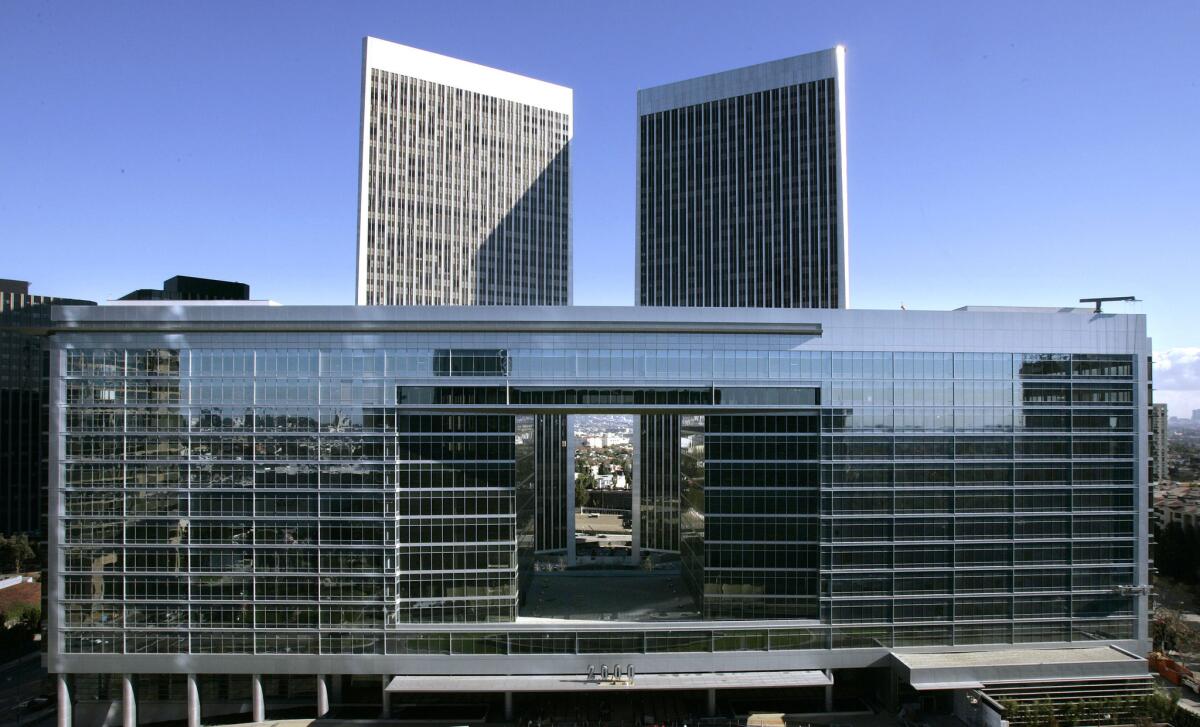CAA agents stage exodus to rival United Talent Agency

CAA has a reputation for a buttoned-down culture reinforced by its gleaming headquarters at 2000 Avenue of the Stars, shown above in 2006 before it was opened.
- Share via
Two of Hollywood’s biggest talent agencies are at war.
Creative Artists Agency suffered a major blow this week with the defection of at least 10 agents representing stars including Chris Pratt, Ed Helms and Will Ferrell to rival United Talent Agency over the course of 24 tumultuous hours.
The exodus represents one of the biggest in the agency business in decades, and insiders say it could be the start of a long-term legal battle, with many expecting CAA to sue on breach-of-contract claims.
What began as a drip-drop of exits on Tuesday morning grew into something more substantial a day later. When the dust had settled, Beverly Hills-based UTA had recruited a trove of agents whose portfolios include high-profile comedy players active in film, television and touring.
The biggest agents to depart Century City-based CAA were Jason Heyman and Martin Lesak, who ran the agency’s comedy division.
CAA and UTA declined to comment about the upheaval, which had Hollywood buzzing over the implications it would have on the highly competitive agency business.
A number of high-level agency executives familiar with the situation said the departing agents were frustrated about compensation and stifled opportunities within CAA’s ranks. There had also been complaints that CAA has been trying to rein in its costs, which hasn’t gone down well in an industry known for lavish perks.
“I really don’t think this has anything to do with corporate culture,” said Gavin Polone, a former ICM talent agent who is now a film and television producer. “It’s about the money.”
Agency wars of the magnitude of this week’s shake-up are rare. The CAA exodus has been compared to the 1995 formation of Endeavor Talent Agency, which was created after Ari Emanuel and other high-profile agents left ICM to strike out on their own.
And CAA itself was formed in 1975 by agents including Michael Ovitz and Ron Meyer after they left William Morris Agency. “It’s all part of the ecosystem,” Polone said.
CAA long was the biggest agency in Hollywood, and was known for its rock-solid stable of big stars. It also has a reputation for a buttoned-down corporate culture reinforced by its gleaming headquarters office at 2000 Avenue of the Stars.
There was a flurry of activity inside CAA’s offices, known around town as the “Death Star,” on Wednesday. Agents were stunned by the velocity of the turnover, according to people at CAA who could not speak publicly. They said the large-scale relocation came with no warning to management, and even assistants turned up to work with no bosses to tend to.
There have been signs of vulnerabilities at CAA.
In 2013, agency veterans Adam Kanter and Martin Spencer left the company to join Resolution, a start-up agency founded by longtime agent Jeff Berg that is no longer in business. The move surprised some, given CAA’s position of dominance and Resolution’s fledgling status.
Last year, CAA also ceded its title as Hollywood’s biggest agency. Beverly Hills-based William Morris Endeavor’s $2.4-billion acquisition of sports and media company IMG Worldwide made that agency the largest in the world.
The influx of agents serves as a boost to UTA, which has nearly 200 agents working in Beverly Hills and New York. The agency, founded in 1991 by the merger of Leading Artists Agency and Bauer-Benedek Agency, counts among its clients Seth Rogen, Kevin Hart and Judd Apatow.
Unlike CAA and WME, UTA is not partly owned by a private equity company. CAA, backed by TPG Capital, and WME, backed by Silver Lake Partners, have used capital from their partners to diversify their businesses into areas such as sports and technology.
UTA operates as a partnership — the traditional business structure used by agencies for decades. That could appeal to some agents who might chafe at a more strict corporate style resulting from private equity ownership.
According to talent agents at rival companies, the presence of private equity ownership since 2010 has led CAA’s management to scrutinize budgets much more intensely.
“The problem is that CAA is now owned by a private equity company and agents don’t like authority. It’s tough. We are taught to question authority to make the best deal for our clients, and being owned by some outsider gets tricky,” said one high-level agent at another firm who was not authorized to speak on the record.
Private equity investment in agencies has not always gone well. In 2012, top ICM agents banded together to buy out Rizvi Traverse Management and convert the agency back to a partnership to better control its destiny.
Times staff writers Meg James and Amy Kaufman contributed to this report.
More to Read
Sign up for The Envelope
Get exclusive awards season news, in-depth interviews and columnist Glenn Whipp’s must-read analysis straight to your inbox.
You may occasionally receive promotional content from the Los Angeles Times.











